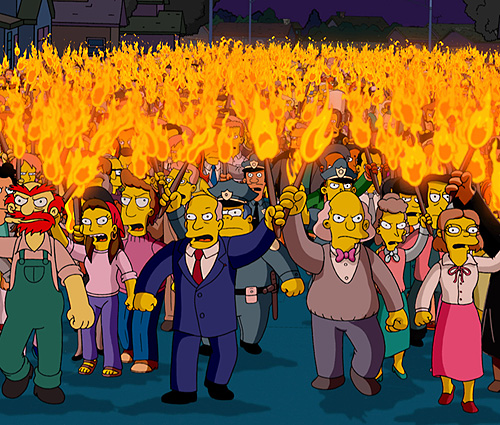No time for a long post, but I need to grab an opportunity to respond to Dan before I lose a whole week. I’m afraid he’s misconstrued my position.
He attributes to me the following position that I do not hold:
a true defense of free speech must necessarily foreclose any argument that it might be imprudent to use one’s right to speak freely in a particular way
I said no such thing.
He also attributes to me this position that I do not hold:
any social stigma you might earn for what you say is an unacceptable attack on the right to speak freely
I said no such thing.
Here is what I said:
Irrational mobs that are attempting to destroy free speech rights must not be permitted to dictate which speech we shall condemn as evil, nor the time, place and manner in which we condemn it.
The distinction does not seem to me to be a very fine one. Not every stigma is a “heckler’s stigma.” I object not to the maintaining of stigmas but to the abuse of the stigmatization process by people whose real agenda is to destroy free speech.
In other words, I am claiming my free speech right to stigmatize only what I think worth stigmatizing, when and where and how I think it worth stigmatizing. I may think Charlie Hebdo is awful, but I refuse to say “Charlie Hebdo is awful” if the time, place and manner of my doing so gives aid and comfort to totalitarians (of either the jihadist or secularist variety).
As if on cue, Mark Steyn posts today about a scientific genius who just had his career destroyed because of one (1) bad remark, for which he apologized to no avail. The remark was indeed a bad one, but I refuse to say so if saying so gives aid and comfort to the totalitarians seeking to destroy him.

Right. So you are saying that you are choosing not to criticize speech because you are afraid doing so would threaten the right to speak freely, and you are inviting others to join you in the no-criticize zone, even when the speech should be criticized. I’m not sure how I’m supposed to reach any conclusion other than that you object to criticizing speech because it undermines the freedom of speech. Which is what I said in my post. Your reservation of the right to criticize notwithstanding, the argument’s structure is unaffected.
The problem here is the belief that an individual’s critical speech can potentially abridge the freedom of speech. It can’t. It’s just not possible – these are entirely different categories. The most that hectoring can accomplish (with respect to speech) is to cause a person to choose not to speak. It is true that the stigmatizers may accomplish a horrible consequential effect, a la the brilliant, but hapless, scientist highlighted by Mark Steyn. But that bears absolutely no relationship, either as a matter of principle or of practice, to the State forcing people to be quiet when what they want to do is speak. The freedom of speech is concerned with the latter; prudence and free will are involved in the former. They don’t cross. Ever.
It seems the answer here is not self-censorship, but going on the offense against those who would exercise their power to stigmatize imprudently. So the response to the scientist’s awkward, throw-away line should be to observe that we just don’t say such things, and then immediately turn on the witless wonders who would drive such an accomplished man from a profession that can use all the intelligence the human community can drum up. The remedy to bad speech, we have often said, is more speech.
And I’ve not missed the irony that your chosen defense of the freedom of speech is to refrain from speaking lest your speech prevent others from speaking. This approach would seem to end in one of two ways. Either we all join the program, in which case we honor the freedom of speech by engaging in a downward spiral of speechlessness. Or one side adopts this position, in which case the speech-commons will be overrun by objectionable speech, but which will go unremarked because we don’t want to risk having less of it.
Well, what we really don’t want is a silent Greg Forster. Speak, man, and rejoice in the confidence that you have no power whatsoever to foreshorten the freedom of speech!
I see two bits of daylight in the middle, here: (1) Might we just call for tactful & tactical delay, a selective wise reserve, until in our judgment the storm has passed? (2) Might we not practice the concessio a bit more in our making of arguments, and learn the skill of conceding in a style which grants only that which in principle we must grant?
I find no difficulty in saying that Charlie Hebdo was a vile, poltroonish rag unworthy even of a drunken frat party’s efforts at witty bus chanting, and yet I would not necessarily say that in the very moment and with the very same level of reprehension as I mention the murders of its staff. And saying that the murderers of its staff were evil people worthy of being hounded down into whatever vile holes they hide in, rooted out, and put on trial for all the world to execrate in no way obligates me to think of the morons at Charlie Hebdo as heroes. But I would be a fool not to recognize in them a degree of physical courage, which was put to a vital test, ennobling them in their final moments, making a tactful pause in our just contempt for Charlie Hebdo the respect virtue owes to disproportionately punished vice.
Do we need, and can we use, an abstracted notion of “free speech” that bifurcates these responses?